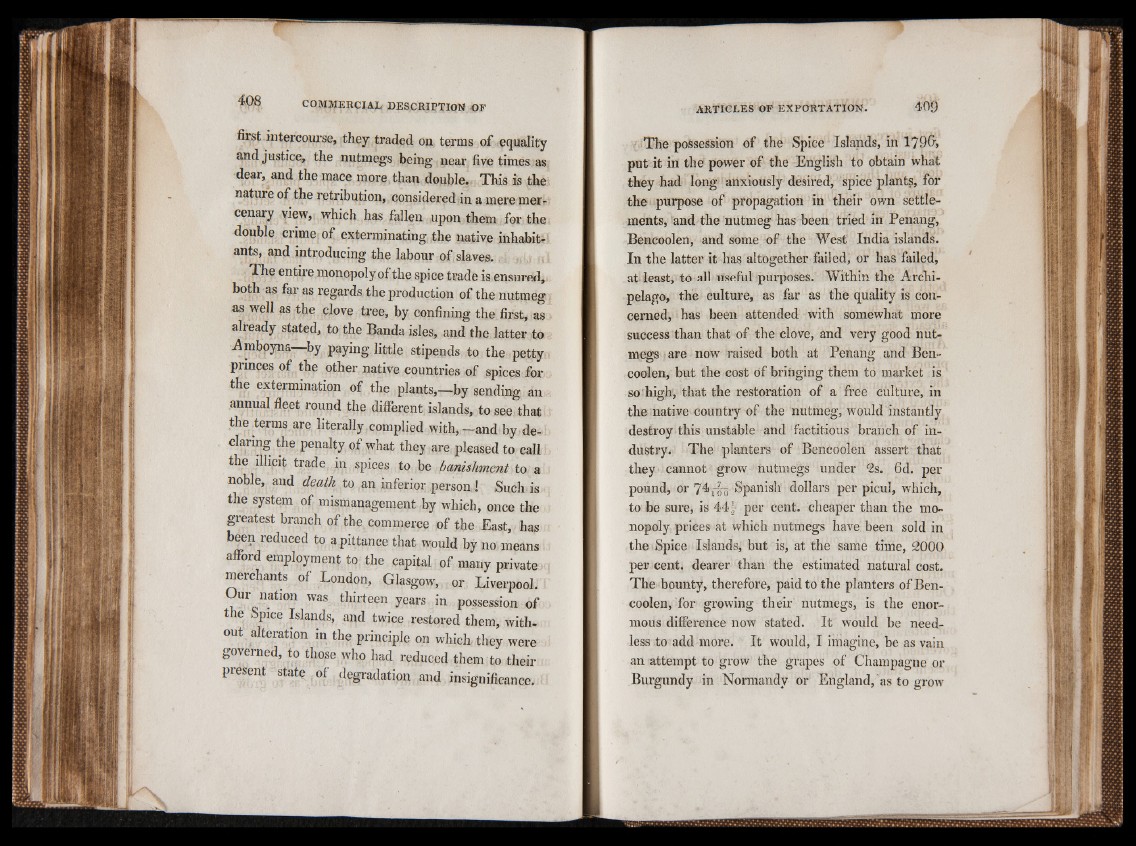
first intercourse, they traded on terms of equality
and justice, the nutmegs being near five times as
dear, and the mace more than double. This is the
nature of the retribution, considered in ameremer-
cenary view, which has fallen upon them for the
double crime of exterminating the native inhabitants,
and introducing the labour of , slaves.
The entire monopoly of the spice trade is ensured,
both as far as regards the production of the nutmeg
as well as the clove tree, by confining the first, as
already stated, to the Banda isles, and the latter to
Amboyna- by paying little stipends to the petty
princes of the other native countries of spices for
the extermination of the plants,—by sending an
annual fleet round the different islands, to see that
the terms are literally complied with,—and by declaring
the penalty of what they are pleased to call
the illicit trade in spices to be banishment to a
noble, and death to an inferior person ! Such is
the system of mismanagement by which, once the
greatest branch of the commerce of the East, has
been reduced to a pittance that would by no means
afford employment to the capital of many private
merchants of London, Glasgow, or Liverpool.
Our nation was thirteen years in possession of
thè Spice Islands, and twice restored them, without
alteration m the principle on which they were
governed, to those who had reduced them to their
present state of degradation and insignificance.
The possession of the Spice Islands, in 179&,
put it in the power of the English to obtain what
they had long anxiously desired, spice plants, for
the purpose of propagation in their own settlements,
and the nutmeg has been tried in Penang,
Bencoolen, and some of the West India islands.
In the latter it has altogether failed, or has failed,
at least, to all Useful purposes. Within the Archipelago,
the culture, as far as the quality is concerned,
has been attended with somewhat more
success than that of the clove, and very good nutmegs
are now raised both at Penang and Bencoolen,
but the cost of bringing them to market is
so high, that the restoration of a free culture, in
the native country of the nutmeg, would instantly
destroy this unstable and factitious branch of industry.
The planters of Bencoolen assert that
they cannot grow nutmegs under 2s. 6d. per
pound, or 74fjg Spanish dollars per picul, which,
to be sure, is 4<4§- per cent, cheaper than the monopoly
prices at which nutmegs have been sold in
the Spice Islands, but is, at the same time, 2000
per cent, dearer than the estimated natural cost.
The bounty, therefore, paid to the planters of Bencoolen,
for growing their nutmegs, is the enormous
difference now stated. It would be needless
to add more. It would, I imagine, be as vain
an attempt to grow the grapes of Champagne or
Burgundy in Normandy or England, as to grow